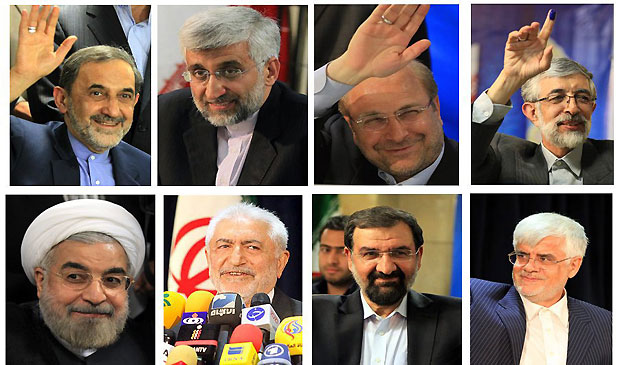
A combo picture made up by the recent pictures taken on various dates at the Iranian Interior Ministry during the registration for Iran’s upcoming presidential election on 14 June, in Tehran, Iran, showing the eight candidates who are accepted by the Guardian Council to stand in Iran’s 14 June 2013 presidential elections. (EPA/Abedin Tahkerenareh)
London, Asharq Al-Awsat—All eight candidates approved to run for Iran’s June 14 presidential election attended a live TV debate addressing economic topics yesterday.
The theme of the debate focused on the economic policies and initiatives that each candidate will pursue should they succeed in the forthcoming elections. The manner in which this televised debate was organized upset some of the candidates who complained about it being downgraded from a serious face-to-face debate into a quiz-like session where candidates were offered multiple choice answers and allotted 90-seconds to answer.
The candidates discussed topics including how to tackle increasing levels of inflation and unemployment, in addition to Iran’s diminishing economic growth. The eight presidential candidates also put forward their agendas to promote and protect domestic production and by-pass international sanctions on Iran’s oil, financial, and industrial sectors.
The recurring feature of the 4-hour long debate consisted of candidates complaining about the management of the televised debate and its moderator, criticizing the inappropriate structure and content of the program which was aired on Iranian state television.
Mohammad Reza Aref, former First Vice President under Mohammad Khatami and the only candidate who describes himself as belonging to the reformist camp stopped answering questions as a sign of protest.
The next live television debate will take place on June 5 and discuss issues relating to culture and society. The finale live group debate will be aired on June 7, less than a week before the presidential elections which are scheduled for June 14. The last debate is set to cover political issues and is widely expected to be the most combative of the debates.
Prior to the 2009 election, Mahmoud Ahmadinejad and Mir Houssein Mousavi verbally clashed over the course of two debates, outraging Iran’s political elite and the general public. Ahmadinejad took the offensive during this election campaign, crossing a number of red-lines by making speculative accusations against former president Hashemi Rafsanjani and other moderate and reformist figures.
As for the forthcoming Iranian presidential elections, and according to debate moderate Mohammad Reza Heydari, “thousands of hours of expert views have been put to work” to ensure a managed debate style. The objective of this is to ensure that candidates do not cross red-lines and trade destructive and personal attacks.
The eight candidates contesting the Iranian presidential elections are Ali Akbar Velayati, former Foreign Minister from 1981 to 1997; Mohammad Qarazi, minister of Oil and telecommunication from 1981 to 1997; Mohammad Baqer Qalibaf mayor of Tehran; Gholam Ali Haddad Adell, former Speaker of Parliament from 2004 to 2008 and current conservative MP; Saeed Jalili, Iran’s top nuclear negotiator; Mohammad Reza Aref, former first vice president; Mohsen Rezaie, former IRGC commander and current Secretary of the Expediency Council; and Hassan Rouhani, Iran’s former top nuclear negotiator and currently the supreme leader’s representative to Iran’s Supreme National Security Council.
